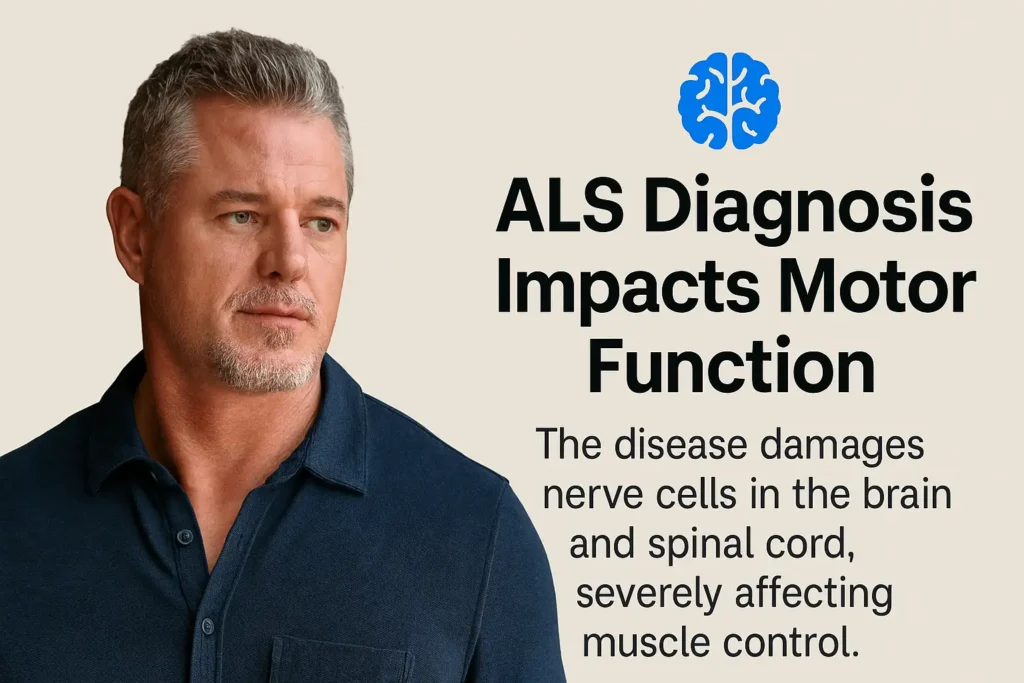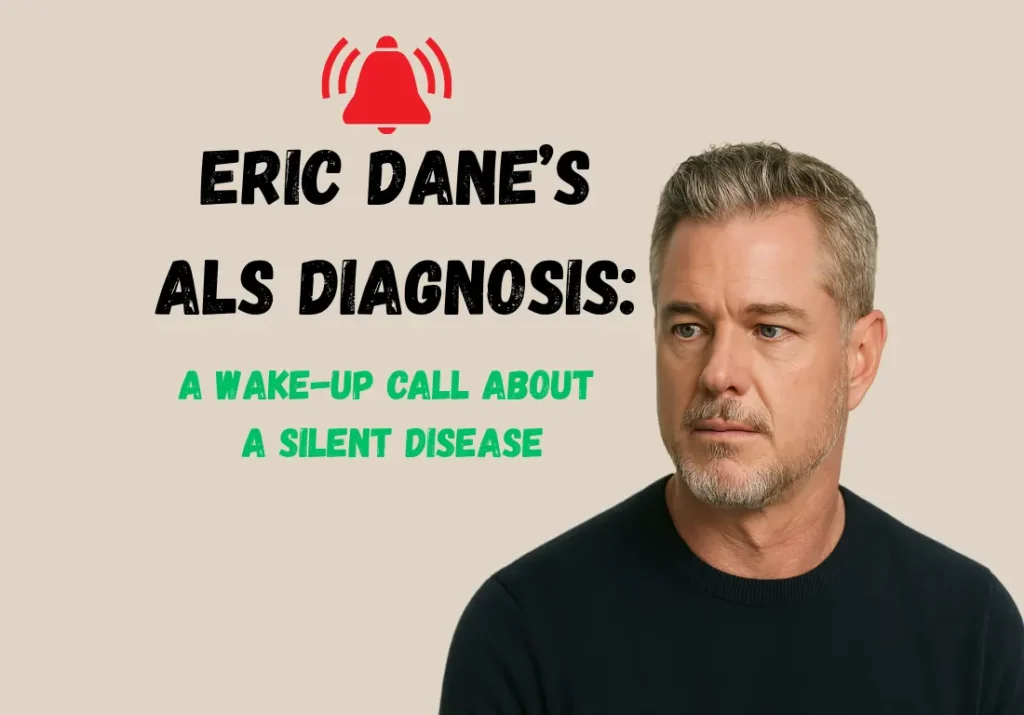Eric Dane’s ALS diagnosis has shocked fans worldwide — the man we knew as “McSteamy” from Grey’s Anatomy is now battling one of the most devastating diseases known to medicine.
ALS, or Amyotrophic Lateral Sclerosis, gradually robs the body of movement, speech, and independence — all while the mind remains fully alert. Also called Lou Gehrig’s Disease, it’s 100% fatal and still without a cure.
So what exactly is ALS? How is Eric Dane coping? And what can we all learn from this moment?
Here’s what you need to know about his diagnosis, the science behind ALS, and how his story is helping shine a light on this silent disease.
Eric Dane’s ALS Diagnosis: Why It Matters
When a public figure like Eric Dane shares a life-changing medical diagnosis, it does more than just make headlines — it starts conversations that matter.
On April 2025, Eric Dane revealed that he has been diagnosed with ALS (Amyotrophic Lateral Sclerosis), a progressive and often misunderstood neurological disorder. While fans may remember him as the charismatic Dr. Mark “McSteamy” Sloan from Grey’s Anatomy or the emotionally complex Cal Jacobs from Euphoria, this recent news shows a vulnerable and very human side of the actor.
Why this diagnosis is significant:
- ALS is rare and serious, affecting nerve cells in the brain and spinal cord.
- The disease gradually robs people of their ability to walk, talk, eat, and eventually breathe.
- High-profile diagnoses like this raise public awareness, spark medical advocacy, and inspire support funding.
Eric Dane’s courage to go public helps shine a light on a disease that’s often kept in the shadows — and offers an opportunity for all of us to better understand, empathize, and act.
Who Is Eric Dane? A Quick Career Snapshot
Before Eric Dane became the face of a trending health topic, he was known for stealing scenes and hearts on screen. A seasoned actor with a charismatic presence, Dane’s career spans two decades — from medical dramas to gritty teen thrillers.
Career Highlights:
- Dr. Mark “McSteamy” Sloan in Grey’s Anatomy
Eric’s breakout role, where he played the smooth-talking plastic surgeon, earned him a massive fanbase and solidified his TV stardom. - Tom Chandler in The Last Ship
As the heroic Navy captain, Dane took on action-packed storylines with emotional depth. - Cal Jacobs in Euphoria
His complex role as a troubled father gave audiences a darker, more intense look at his acting range.
Beyond the screen, Eric Dane is admired for his openness about personal struggles, including mental health and now, his ALS diagnosis.
His journey from Hollywood heartthrob to advocate for awareness brings a new dimension to his public identity — one that many find inspiring and deeply human.

What Is ALS (Amyotrophic Lateral Sclerosis)?
ALS, or Amyotrophic Lateral Sclerosis, is a rare but serious neurological condition that affects the nerve cells responsible for controlling voluntary muscles. You may have also heard it referred to as Lou Gehrig’s Disease, named after the famous baseball player who was diagnosed in the 1930s.
What Actually Happens in ALS?
- The motor neurons in the brain and spinal cord start to break down.
- These neurons control muscles used to move, speak, eat, and breathe.
- Over time, the muscles weaken and eventually become paralyzed.
This progressive breakdown means that people with ALS often lose the ability to walk, talk, and perform daily tasks — while the brain typically remains sharp.
Key ALS Symptoms:
| Early Symptoms | Advanced Symptoms |
|---|---|
| Muscle twitches (especially in arms or legs) | Difficulty speaking or swallowing |
| Slurred speech | Severe muscle weakness and coordination loss |
| Stiff or tight muscles | Respiratory problems (shortness of breath) |
| Difficulty with grip or walking | Complete loss of voluntary movement |
Causes & Risk Factors
While the exact cause of ALS remains unknown, experts believe a mix of genetic and environmental factors may play a role. Some known risk factors include:
- Age (usually diagnosed between 40–70)
- Gender (slightly more common in men)
- Family history of ALS (genetic mutations)
- Exposure to certain toxins or military service
Eric Dane’s diagnosis helps spotlight just how unpredictable and life-altering ALS can be — even for healthy, active individuals.
Eric Dane’s Public Statement and Fan Reactions
When Eric Dane publicly confirmed his ALS diagnosis in April 2025, the news quickly spread across major media outlets and social media platforms. Though details are still emerging, Dane’s message was clear: he wanted to bring awareness to ALS, support others going through it, and encourage more open dialogue around the disease.
What Eric Dane Said
While the exact wording of his statement varies by outlet, the core of his message emphasized:
- Gratitude for the support he’s received
- His commitment to staying strong and proactive
- Encouragement for others to learn more about ALS and show empathy
Dane reportedly shared,
“This diagnosis doesn’t define me. I’m still me. If sharing this can help even one person feel less alone, it’s worth it.”
Public & Celebrity Reactions
The announcement sparked an outpouring of support:
- Fans flooded social media with messages like “Stay strong, McSteamy!” and “Eric, we’re with you all the way.”
- Fellow actors and co-stars shared heartfelt tributes, with many posting throwbacks from Grey’s Anatomy and Euphoria.
- ALS foundations like the ALS Association and Team Gleason thanked Dane for using his platform to raise awareness.
On Twitter, the hashtag #EricDaneALS trended for over 24 hours — highlighting how deeply this news resonated worldwide.
Eric Dane’s courage to speak out not only humanizes the struggle but also reminds fans of the power of vulnerability, especially from someone in the spotlight.
How ALS Affects the Body and Mind
ALS doesn’t just affect the muscles — it affects entire lives. From the physical body to mental health, the impact is far-reaching. Understanding this is key to appreciating the strength it takes to live with the disease — and why Eric Dane’s story matters.
Physical Impact of ALS
As ALS progresses, the body slowly loses control over voluntary muscle movements. This includes basic functions like:
- Walking and standing
- Gripping and holding objects
- Speaking and swallowing
- Breathing independently
Because the brain remains fully aware, individuals often endure the emotional pain of watching their body fade while their mind stays intact — a cruel paradox of the disease.

Mental and Emotional Toll
While ALS itself doesn’t directly impair memory or thinking, the experience of progressive decline can lead to:
- Anxiety and depression
- Feelings of isolation or frustration
- Emotional lability (sudden emotional outbursts or crying, common in ALS)
Loved ones often struggle emotionally as well, watching their family member or friend’s condition change over time.
Why Public Awareness Is Critical
The emotional strength it takes to live with ALS — or to care for someone who does — is immense. When celebrities like Eric Dane share their diagnosis, they:
- Help reduce the stigma of disability
- Create space for honest conversations
- Encourage others to seek early diagnosis and support
Other Celebrities Diagnosed with ALS
Eric Dane’s diagnosis joins a small but powerful list of public figures who’ve battled ALS — each one helping to shine a light on a disease that’s too often hidden in the shadows.
These real-life stories remind us that ALS doesn’t discriminate. It affects athletes, artists, scientists, and everyday people alike.
Notable Figures Who Faced ALS
| Name | Known For | ALS Journey |
|---|---|---|
| Lou Gehrig | Baseball legend (New York Yankees) | Diagnosed in 1939, his farewell speech brought ALS to national attention |
| Stephen Hawking | World-renowned physicist | Lived with ALS for 55+ years — defying odds and redefining what’s possible |
| Steve Gleason | Former NFL player | Founded Team Gleason to empower ALS patients through technology |
| O.J. Brigance | Super Bowl champion with the Ravens | Created the Brigance Brigade Foundation to support ALS families |
| Jason Becker | Guitar prodigy | Composes music using eye-tracking tech after losing all motor function |
Why Celebrity Cases Matter
- They bring massive awareness to the disease
- Their visibility drives fundraising and research
- They inspire others living with ALS to keep fighting
- They break stereotypes — showing ALS doesn’t mean giving up
Just as Stephen Hawking helped reframe how we see disability and intellect, Eric Dane’s story can reshape how we think about ALS and emotional strength.
The Emotional and Social Impact of ALS
While the physical symptoms of ALS are devastating, the emotional and social effects can be just as life-altering — not just for the person diagnosed, but also for their family, friends, and caregivers.
Eric Dane’s openness helps us explore this side of the disease with empathy and awareness.
Emotional Impact on Patients
Living with ALS often leads to a rollercoaster of emotions. The gradual loss of independence can trigger:
- Depression and anxiety
- Feelings of helplessness or grief
- Emotional lability — uncontrollable laughing or crying, common in neurological conditions
Many patients say that the hardest part isn’t losing movement — it’s watching life change while still fully mentally present.
Impact on Families and Relationships
ALS doesn’t affect just one person — it touches everyone around them. Spouses may become full-time caregivers. Children may struggle to understand. Friends may drift away, unsure of how to help.
Common challenges include:
- Financial strain from treatments, therapies, and home care
- Emotional burnout and caregiver fatigue
- Social isolation for both the patient and their loved ones
Why Support Networks Are Critical
Eric Dane’s story reminds us that visibility matters. When someone with a platform shares their vulnerability:
- It reduces shame and stigma
- Encourages people to seek counseling and community
- Opens doors for advocacy, donations, and public programs
No one should face ALS alone — and stories like Eric’s show us how connection can bring strength.
Raising Awareness: What You Can Do
Eric Dane’s decision to share his ALS diagnosis isn’t just brave — it’s also a powerful call to action. It reminds us that awareness alone can spark change, and each of us has a role to play in supporting people with ALS.
Whether you’re a fan, a caregiver, or someone just learning about the condition, here are meaningful ways you can get involved.
Understanding what ALS is (and what it isn’t) helps fight misinformation. Start by reading from trusted sources like:
Share awareness posts on social media — even a retweet or story can reach someone who needs support.
2. Donate to ALS Research and Support Programs
Even small donations can contribute to:
- Funding for experimental treatments and clinical trials
- Equipment for people living with ALS (wheelchairs, voice tech, etc.)
- Emotional support programs for families
Popular ALS organizations:
3. Participate in Walks and Fundraisers
Events like Walk to Defeat ALS take place all over the world. You can join virtually or in person to raise funds and show community support.
4. Start the Conversation
Don’t be afraid to talk about ALS. Ask questions. Share articles. Post about Eric Dane’s journey. The more people discuss it, the less invisible it becomes.

Myths and Misconceptions About ALS
ALS is often misunderstood, and that can lead to fear, stigma, and even misinformation. Thanks to Eric Dane’s openness, we have an opportunity to bust some common myths and promote clearer understanding of the disease.
Let’s separate fact from fiction.
❌ Myth #1: ALS Only Affects the Elderly
✅ Truth: While ALS is more common in people aged 40–70, it can affect younger adults too. Even athletes and actors in their physical prime — like Eric Dane — are not immune.
❌ Myth #2: ALS Is Contagious
✅ Truth: ALS is not contagious. You cannot catch it through contact or proximity. It is a neurodegenerative condition, not an infection.
❌ Myth #3: People with ALS Lose All Brain Function
✅ Truth: Most ALS patients remain fully alert and mentally sharp, even as their muscles weaken. This is part of what makes the disease so emotionally challenging.
❌ Myth #4: There’s Nothing You Can Do About It
✅ Truth: While there is no cure (yet), treatments like riluzole and edaravone can help manage symptoms and slow progression. Supportive therapies like speech, occupational, and physical therapy make a big difference.
❌ Myth #5: It’s Rare, So Awareness Isn’t Urgent
✅ Truth: ALS affects thousands of people worldwide and many go undiagnosed or unsupported. Every voice counts in raising awareness and pushing for research funding.
📝 Conclusion: What We Can Learn from Eric Dane’s Story
Eric Dane’s ALS diagnosis is more than celebrity news — it’s a powerful reminder of life’s unpredictability and the importance of empathy, awareness, and action.
By sharing his journey publicly, Dane has:
- Humanized a complex and devastating disease
- Given strength to others silently facing similar battles
- Sparked much-needed conversations around ALS, disability, and long-term support
💡 Final Takeaways:
- ALS is not rare in its impact — it affects families, emotions, and entire communities.
- Awareness leads to action — from early detection to funding research and caregiver support.
- Stories matter — because when people like Eric Dane speak up, they give others the courage to do the same.
💬 A Gentle Call to Action:
If this story touched you, take one small step today:
- Learn more about ALS
- Share this article with a friend
- Support an ALS nonprofit
- Or simply send a message of encouragement to someone who needs it
Because even in silence, there’s strength — and even in struggle, there’s purpose.
❓ FAQs: Eric Dane, ALS, and What It Means
To clear up the most common questions floating around the web — especially with the spike in search traffic — here’s a helpful, SEO-optimized FAQ section. These questions reflect what people are actively searching for after hearing about Eric Dane’s ALS diagnosis.
🔍 What is ALS?
ALS (Amyotrophic Lateral Sclerosis), also known as Lou Gehrig’s Disease, is a progressive neurological condition that affects the nerve cells controlling voluntary muscle movement. Over time, it leads to muscle weakness, paralysis, and difficulty speaking, eating, and breathing.
🔍 When did Eric Dane announce his ALS diagnosis?
Eric Dane publicly confirmed his ALS diagnosis in April 2025, sparking global discussions about ALS awareness and support. The news quickly became a top-trending topic on Google and social media platforms.
🔍 Is ALS curable?
Currently, there is no cure for ALS. However, medications and therapies can help slow progression and improve quality of life. Ongoing research and clinical trials are working toward more effective treatments and, ultimately, a cure.
🔍 Can ALS affect mental abilities?
In most cases, cognitive function remains intact, meaning people with ALS can think, feel, and remember like before. Some individuals may experience emotional changes, such as sudden crying or laughing (pseudobulbar affect), but full cognitive decline is rare.
🔍 What are the early warning signs of ALS?
- Muscle twitching or cramping
- Slurred speech
- Difficulty walking or lifting things
- Weak grip or hand coordination
- Unusual fatigue or stiffness
If you notice these symptoms, consult a neurologist for a full evaluation.
🔍 How can fans support Eric Dane and ALS awareness?
You can:
- Share accurate information about ALS online
- Donate to trusted ALS organizations
- Join virtual or local awareness events
- Simply express support online using hashtags like #EricDaneALS

